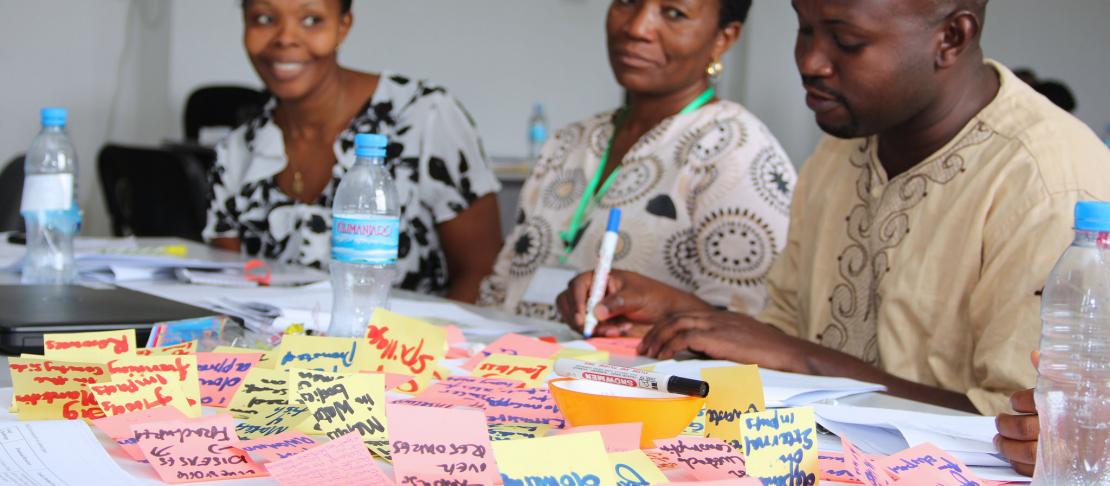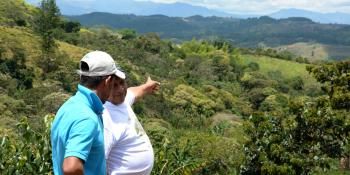Video gives a fresh look at scenario-guided policy planning in East Africa

Video shows scenario-guided policy planning processes that help generate more climate-resilient development strategies.
Two scenario-guided policy development workshops have now been held in Tanzania and Uganda as part of the Policy Action for Climate Change Adaptation (PACCA) project activities.
Both workshops, held back in February, involved policy makers, researchers and civil society members analyzing draft policy documents in great detail, and subjecting them to a set of diverse future contexts, or scenarios. This resulted in new versions of the policies that are more likely to be climate-robust and sustainable.
The Policy Action for Climate Change Adaptation (PACCA) project is led by the International Institute for Tropical Agriculture (IITA) and aims at influencing and linking policies and institutions for the development and adoption of climate-resilient food systems in Uganda and Tanzania. The work is part of the CGIAR Research Program on Climate Change, Agriculture and Food Security (CCAFS) policies and institutions research.
To support their goal, the group has engaged with CCAFS scenario team from the University of Oxford, who are designing and conducting participatory scenario-guided policy processes around the world.
A recently released video illustrates what went on during the back-to-back scenarios workshops in Tanzania and Uganda.
In Tanzania, participants examined the first draft Revised National Environmental Policy (NEP), whereas Ugandan participants focused on Uganda’s Mechanization Framework and the National Agriculture Policy. Subsequently, they downscaled regional scenarios for East Africa.
These scenarios were originally created by CCAFS with regional stakeholders, and then quantified using two agricultural economic models – GLOBIOM, developed by International Institue for Applied Systems Analysis (IIASA), and IMPACT, developed by International Food Policy Research Institute (IFPRI).
These downscaled, tailored Tanzania and Uganda scenarios served as a kind of crash test for the policy documents, in which the question ‘Will this plan work in the context of all four scenarios?’ was central.
Farafa Ngerageza, principal agriculture officer in charge of environment at the Vice Presidents Office and participant in the Tanzania workshop, thought this process contributed a lot to the new policy:
“In the past we just put the issues in the policy without even testing them through a set of different scenarios to find out [whether] it is going to work or if it is not going not work.” and adds: “I know that we will be using these scenarios every time we develop our new policies or review any policies.”
Paul Omany, principal fisheries officer for the Ministry of Agriculture (MAAIF), one of the participants from the Uganda workshop, saw enormous benefits in using scenarios to enhance policy development. He explains in the video:
“Scenarios give you a more critical lens to look at how you can come up with a policy that is going to stand the test of time. Sector specific policies that we are developing should be subjected to this tool.” Paul also thinks scenarios help enhance local capacity: “We are building the capacity of the technical people for them to be in a position to develop policies that can really address the issues in the sector.”
Since the workshops several follow-up steps in Tanzania have been taken, as key stakeholders met in end of April to discuss the scenarios and review the draft a second time. Now a third draft, built on the scenario-recommendations, have been handed over to the Vice President's Office and the consultants in charge of the NEP review process.
Related Reading:
- Project takes action for climate-responsive policies in East Africa
- Scenario-guided policy planning makes headway in Tanzania
- Brief: Future Scenarios (PDF)
Communication consultant Elisabeth van de Grift produced the video and joined by Lucas Rutting, Scenarios coordinator for East and West Africa, put together the blog. Story edited by Cecilia Schubert, Communication Officer for CCAFS Flagship on policies and institutions.
Interested in policies and institutions for climate-resilient food systems? Subscribe to our newsletter.



